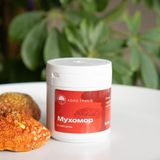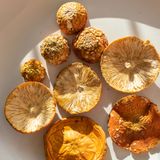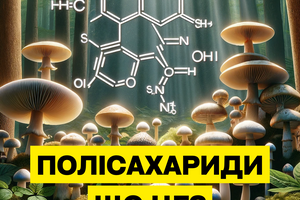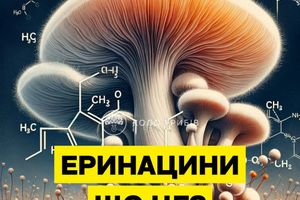Alcohol addiction and fly agaric
Ibotenic acid is one of the active substances of red amanita. One of the mechanisms by which ibotenic acid can reduce cravings for alcohol is its effect on dopamine receptors. Dopamine is a neurotransmitter associated with pleasure and reward. Alcohol increases the level of dopamine in the brain, which can contribute to the development of alcohol dependence. There is a version that red fly agaric can affect dopamine receptors in such a way that alcohol does not cause a person to feel pleasure. This mechanism may be one of the factors that contribute to the reduction of cravings for alcohol when taking red amanita.
However, to date, there are no specific studies that would confirm this version. But there are studies that were conducted on people and showed that taking red amanita led to a decrease in alcohol consumption and cravings for it. However, these studies did not specifically examine the effects of amanita muscaria on dopamine receptors. That is, there is scientifically proven data that amanita reduces cravings for alcohol, but scientists still do not know exactly how it does this.
Another interesting point is that animal studies have shown that ibotenic acid can increase the number of dopamine receptors in the brain and can also increase the sensitivity of these receptors to dopamine. If we translate the results to people, it means that a person feels more pleasure from activities other than drinking alcohol.
What do human studies say?
A 2018 study published in the journal "Alcoholism: Clinical and Experimental Research" found that taking red fly agaric for 6 weeks led to a significant reduction in alcohol consumption in people with alcohol dependence. Study participants who took red fly agaric consumed 40% less alcohol than those who took a placebo.
A 2020 study published in the journal PLOS One found that taking red amanita mushroom for 4 weeks reduced alcohol cravings in people with alcohol dependence. Study participants who took red fly ash reported a 30% reduction in alcohol cravings compared to those who took a placebo.
A 2022 study published in the Journal of Psychopharmacology found that taking agaricus agaricus for 8 weeks reduced alcohol withdrawal symptoms in people with alcohol dependence. Study participants who took red fly ash reported a 25% reduction in withdrawal symptoms compared to those who took a placebo.
Amanita also contains muscimol. Muscimol is a compound that actively interacts with the GABA mediator.
GABA is a neurotransmitter that transmits signals between neurons in the parasympathetic nervous system. The parasympathetic nervous system is responsible for controlling the organs in a state of rest and relaxation. It is with the GABA mediator that alcohol interacts, and to be more precise, ethanol. It is through this competition between muscimol and ethanol that the process that helps people get rid of alcohol addiction occurs.
In simple terms, muscimol molecules occupy places that ethanol could occupy. This leads to the fact that ethanol cannot interact with the GABA mediator as effectively as before. As a result, the pleasure that a person gets from drinking alcohol decreases, and the craving for it decreases.
This mechanism is one possible explanation for how amanita may help in the treatment of alcohol addiction. However, more research is needed to fully understand how fly agaric affects alcohol cravings.
You can buy fly agaric for the treatment of alcohol addiction in our store
For each client individually, we draw up instructions according to his indicators and requests
Monthly rate:
- Course for beginners Fly agaric whole/ground 50g+jewelry scales - 39$
- Fly agaric whole 50 g - 31$
- Fly agaric 60 capsules - 27$
- Fly agaric for 3 months 180 capsules - 57$
Other articles on the topic:
- The chemistry of amanita and its effect on humans
- The effect of the mushroom (Amanita muscaria) on stress, anxiety and quality of life in people with chronic fatigue syndrome
- Amanita muscaria for the Treatment of Alcohol Withdrawal Syndrome
Contact us:














































